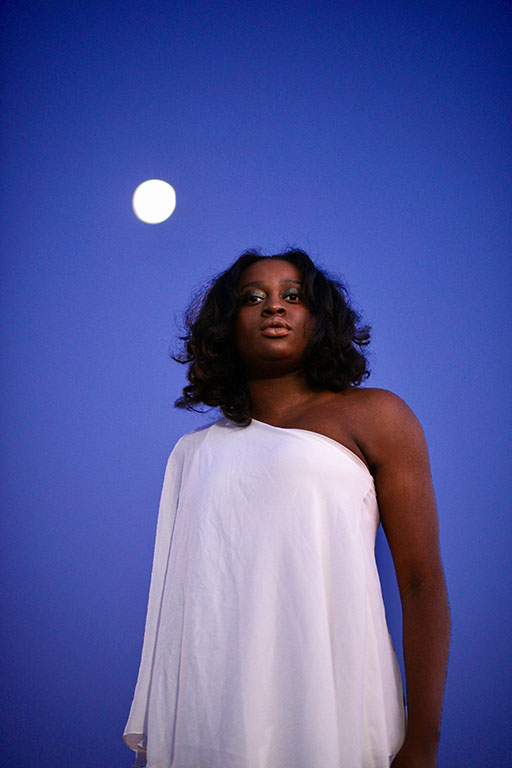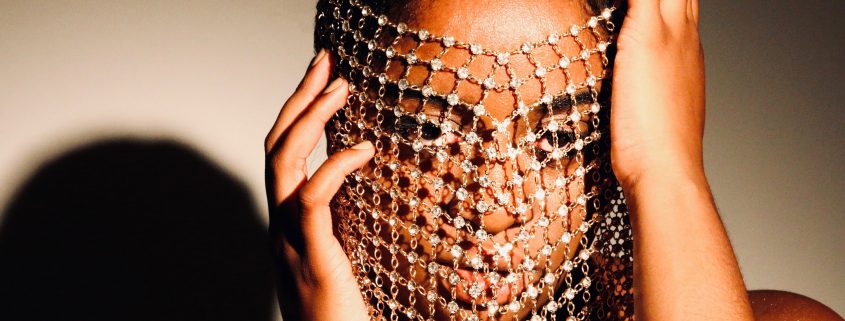A Divine Sound: With Genre Dead, Ayoni is Very Much Alive

“Ayoni, a rising R&B singer from Barbados,” is how Paper Magazine describes Thornton School of Music’s Ayoni Thompson.
Despite the nod from the famed culture publication, in her own eyes, Ayoni’s artistry is not constrained by a simple descriptor like rhythm and blues; and, while it showcases her Barbadian roots, it also transcends them.
Ayoni is a rockstar. But it doesn’t have to be said — you’ll see it, you’ll hear it and you’ll feel it.
Music birthed by Ayoni goes beyond adjective — and it intentionally goes beyond genre.
“I would hope that when people describe my music they’d be stressed trying to figure out who it sounds like,” Ayoni said.
The junior in USC’s popular music program released her first single, “Divine,” to rave reviews on Sept. 6 — including a debut in Essence Magazine and a feature on Ones To Watch. The breadth of visibility she earned with the song is a dream for any new artist, but for Ayoni, regardless of opinion, she’s personally obsessed with the song.
“The best art is art is that is just so sure of itself,” Ayoni said. “It doesn’t really matter if you love it, doesn’t matter if you hate it.”
Such is Ayoni’s attitude toward reviews, positive or negative. And “Divine,” after two years in the making, was sure of itself.
The pop-electric track that flirts with Caribbean influences is the singer’s affirmation to herself. While writing “Divine,” Ayoni was freshly in love and thinking about how her new relationship was flooded with “such unconditional love,” as she described it, one “that society [doesn’t] show Black women in general.”
Ayoni basks in this love, conveying it through lyrics like “Noble enough flaunt me on your crest now baby.”
Beyond the glory of her personal relationship, and a message stemming from her experience as a black woman, upon its release, she realized there was more power behind “Divine” than she thought.
The day the track dropped, “Divine” mixer and fellow Thornton student Cole Mitchell told her that some of his black queer friends were touched to see her speaking up for the LGBTQ community in her Essence feature. In the piece, she described the track as “the peoples’ song.” The track’s success showed her that music’s power has no limit.
The two years Ayoni worked on “Divine” did not only tell the tale of her craftsmanship but of her time as a student at USC.
Coming to the Thornton school in 2017 was a catalyst in Ayoni’s growth as an artist. Her music career moved beyond something she did within the walls of her bedroom to a commitment to learning her craft at the highest level possible.
She credits her ongoing Thornton education with elevating the complexity of her performances and increasing comfortability on the stage. The school has also continued to push her to be open to critique and criticism — specifically, criticism from “living legend,” as Ayoni calls her, Patrice Rushen.
Rushen is the chair of USC’s popular music program; known for her blending of jazz, pop and R&B in the ’70s and ’80s. Most notably, Rushen is the composer and artist behind the hit song, “Forget Me Nots.”
“Having her breathe so much life into my music,” Ayoni said, is what made “Divine” the track we hear today.
When Rushen heard the track’s original demo, she told Ayoni that she didn’t know what she wanted from the drums, she didn’t know what she wanted her audience to feel and she didn’t know how they would dance to it.
Ayoni was devastated and stressed by the critique, but she described it as one of the experiences that made the production — and herself as an artist — better. She learned to put ego aside and serve the music, the process and the craft — and yes, she refined the drums.
Rushen is not the only Trojan affiliate who aided in Ayoni’s metamorphosis as an artist. Artists like Bran Movay, UMI and Mato Wayuhi were some of the first she was introduced to at USC who also inspired and pushed her craft.
“USC is a community of people where authenticity is so important … being yourself means there is room for everyone,” Ayoni said. “That inspiration I was constantly drawing from just being around people elevated the craft to new heights.”
Essential to Ayoni’s relationships to the USC creative community, her upcoming single “Malibu” and her EP “Iridescent” is her photographer and creative director Caleb Griffin, a senior in the Roski School of Art and Design’s fine arts program.
Ayoni emphasizes the importance of making her music ethereal. She wants her music to take listener’s to another world and credits Griffin with advancing her vision through cover art.

“The beautiful thing about his art is the fact that it brings you there, it gives you enough context to know you are not here,” Ayoni said.
When reflecting on their creative process, Griffin recalls a conversation between the two where she described her music as ancient and almost hymnal.
And when creating with her, he is constantly reminded that things in this other world, the one where she wants her music to take her listeners “are gonna look, are gonna feel different,” he says. Divine, if you will.
With Ayoni’s genre-defying attitude in mind, one of the best ways to describe her music would be “Afrofuturistic,” (see the music of Parliament-Funkadelic or Janelle Monáe, the novels of Octavia Butler or the canvas of Jean-Michel Basquiat for reference).
Thematically and sonically, she’s singing about a love people who look like her don’t usually get. And the unreleased tracks she shared take you to a different world. Afrofuturism envisions Black futures through Afro Diasporic experiences, an inherently political message that fits the stylings of an artist who sees her art as political and pushes herself to bring it to its fullest potential.
“Now that I exist as an artist, how can I use my music to change the world and better the world?” Ayoni said. “It doesn’t have to be from a preachy place, but how can I do that just from being my most authentic self?”
Her relationship to politics in her work expands beyond who the lyrics touch or inspire but also has roots in her upbringing.
When asked how her parents perceived the love she had for music at an early age, Ayoni described them as being “real” in terms of potential career paths for their daughter.
Ayoni said Barbados, where she was born, is a place where STEM career paths are encouraged due to the lifestyle they guaranteed in formerly colonized places like her home country — a sentiment many first-generation creatives know all too well.
Not everyone has the privilege to create and stand in their truth artistically like Ayoni or fellow Barbadian singer Rihanna do. In Ayoni’s eyes, the ability to be authentic and transcend the lasting effects of colonization is political.
But regardless of cultural expectations and her parents’ initial hesitation, her love and pursuit of music could not be suppressed.
The throughline in Ayoni’s artistry is its proximity to divinity. From early childhood, she has been obsessed with “leading someone into a divine experience” through music. At a young age, she watched her dad lead a church rehearsal, calling it one of her first moments of consciousness with music.
Eventually, her parents realized the depth of her talent and the love for music that moment had sparked, calling it a “gift from God.” Her music was now something to be taken seriously.
From being born in Barbados to moving to Miami during her early childhood, then Singapore for 18 months, California for six years and finally Jakarta for some of her high school years, her musical taste grew, developed and became defined by her surroundings.
Next for Ayoni is a single titled “Malibu,” which features a thematic and sonic departure from her debut. It’s not the upbeat, self-affirming ballad “Divine” is, but since it is Ayoni’s, it’s unique and honest.
“I wanted to start my career out being very intentional about the first messages people received,” Ayoni said.
Her goal with “Divine,” Malibu” and “Iridescent” is to show that it’s possible to change the norms and narratives of not only genre but the ways in which artists tell stories and truths through music.
“By the time people make it through my project,” Ayoni said, “they’ll understand that, for me as an artist, genre is not real.”

